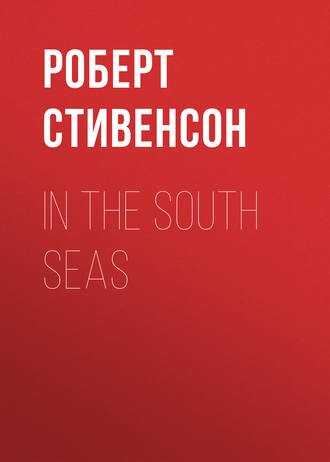
Роберт Льюис Стивенсон
In the South Seas
It adds a last touch of horror to the thought of this precarious annular gangway in the sea, that even what there is of it is not of honest rock, but organic, part alive, part putrescent; even the clean sea and the bright fish about it poisoned, the most stubborn boulder burrowed in by worms, the lightest dust venomous as an apothecary’s drugs.
CHAPTER III – A HOUSE TO LET IN A LOW ISLAND
Never populous, it was yet by a chapter of accidents that I found the island so deserted that no sound of human life diversified the hours; that we walked in that trim public garden of a town, among closed houses, without even a lodging-bill in a window to prove some tenancy in the back quarters; and, when we visited the Government bungalow, that Mr. Donat, acting Vice-Resident, greeted us alone, and entertained us with cocoa-nut punches in the Sessions Hall and seat of judgment of that widespread archipelago, our glasses standing arrayed with summonses and census returns. The unpopularity of a late Vice-Resident had begun the movement of exodus, his native employés resigning court appointments and retiring each to his own coco-patch in the remoter districts of the isle. Upon the back of that, the Governor in Papeete issued a decree: All land in the Paumotus must be defined and registered by a certain date. Now, the folk of the archipelago are half nomadic; a man can scarce be said to belong to a particular atoll; he belongs to several, perhaps holds a stake and counts cousinship in half a score; and the inhabitants of Rotoava in particular, man, woman, and child, and from the gendarme to the Mormon prophet and the schoolmaster, owned – I was going to say land – owned at least coral blocks and growing coco-palms in some adjacent isle. Thither – from the gendarme to the babe in arms, the pastor followed by his flock, the schoolmaster carrying along with him his scholars, and the scholars with their books and slates – they had taken ship some two days previous to our arrival, and were all now engaged disputing boundaries. Fancy overhears the shrillness of their disputation mingle with the surf and scatter sea-fowl. It was admirable to observe the completeness of their flight, like that of hibernating birds; nothing left but empty houses, like old nests to be reoccupied in spring; and even the harmless necessary dominie borne with them in their transmigration. Fifty odd set out, and only seven, I was informed, remained. But when I made a feast on board the Casco, more than seven, and nearer seven times seven, appeared to be my guests. Whence they appeared, how they were summoned, whither they vanished when the feast was eaten, I have no guess. In view of Low Island tales, and that awful frequentation which makes men avoid the seaward beaches of an atoll, some two score of those that ate with us may have returned, for the occasion, from the kingdom of the dead.
It was this solitude that put it in our minds to hire a house, and become, for the time being, indwellers of the isle – a practice I have ever since, when it was possible, adhered to. Mr. Donat placed us, with that intent, under the convoy of one Taniera Mahinui, who combined the incongruous characters of catechist and convict. The reader may smile, but I affirm he was well qualified for either part. For that of convict, first of all, by a good substantial felony, such as in all lands casts the perpetrator in chains and dungeons. Taniera was a man of birth – the chief a while ago, as he loved to tell, of a district in Anaa of 800 souls. In an evil hour it occurred to the authorities in Papeete to charge the chiefs with the collection of the taxes. It is a question if much were collected; it is certain that nothing was handed on; and Taniera, who had distinguished himself by a visit to Papeete and some high living in restaurants, was chosen for the scapegoat. The reader must understand that not Taniera but the authorities in Papeete were first in fault. The charge imposed was disproportioned. I have not yet heard of any Polynesian capable of such a burden; honest and upright Hawaiians – one in particular, who was admired even by the whites as an inflexible magistrate – have stumbled in the narrow path of the trustee. And Taniera, when the pinch came, scorned to denounce accomplices; others had shared the spoil, he bore the penalty alone. He was condemned in five years. The period, when I had the pleasure of his friendship, was not yet expired; he still drew prison rations, the sole and not unwelcome reminder of his chains, and, I believe, looked forward to the date of his enfranchisement with mere alarm. For he had no sense of shame in the position; complained of nothing but the defective table of his place of exile; regretted nothing but the fowls and eggs and fish of his own more favoured island. And as for his parishioners, they did not think one hair the less of him. A schoolboy, mulcted in ten thousand lines of Greek and dwelling sequestered in the dormitories, enjoys unabated consideration from his fellows. So with Taniera: a marked man, not a dishonoured; having fallen under the lash of the unthinkable gods; a Job, perhaps, or say a Taniera in the den of lions. Songs are likely made and sung about this saintly Robin Hood. On the other hand, he was even highly qualified for his office in the Church; being by nature a grave, considerate, and kindly man; his face rugged and serious, his smile bright; the master of several trades, a builder both of boats and houses; endowed with a fine pulpit voice; endowed besides with such a gift of eloquence that at the grave of the late chief of Fakarava he set all the assistants weeping. I never met a man of a mind more ecclesiastical; he loved to dispute and to inform himself of doctrine and the history of sects; and when I showed him the cuts in a volume of Chambers’s Encyclopædia– except for one of an ape – reserved his whole enthusiasm for cardinals’ hats, censers, candlesticks, and cathedrals. Methought when he looked upon the cardinal’s hat a voice said low in his ear: ‘Your foot is on the ladder.’
Under the guidance of Taniera we were soon installed in what I believe to have been the best-appointed private house in Fakarava. It stood just beyond the church in an oblong patch of cultivation. More than three hundred sacks of soil were imported from Tahiti for the Residency garden; and this must shortly be renewed, for the earth blows away, sinks in crevices of the coral, and is sought for at last in vain. I know not how much earth had gone to the garden of my villa; some at least, for an alley of prosperous bananas ran to the gate, and over the rest of the enclosure, which was covered with the usual clinker-like fragments of smashed coral, not only coco-palms and mikis but also fig-trees flourished, all of a delicious greenness. Of course there was no blade of grass. In front a picket fence divided us from the white road, the palm-fringed margin of the lagoon, and the lagoon itself, reflecting clouds by day and stars by night. At the back, a bulwark of uncemented coral enclosed us from the narrow belt of bush and the nigh ocean beach where the seas thundered, the roar and wash of them still humming in the chambers of the house.
This itself was of one story, verandahed front and back. It contained three rooms, three sewing-machines, three sea-chests, chairs, tables, a pair of beds, a cradle, a double-barrelled gun, a pair of enlarged coloured photographs, a pair of coloured prints after Wilkie and Mulready, and a French lithograph with the legend: ‘Le brigade du Général Lepasset brûlant son drapeau devant Metz.’ Under the stilts of the house a stove was rusting, till we drew it forth and put it in commission. Not far off was the burrow in the coral whence we supplied ourselves with brackish water. There was live stock, besides, on the estate – cocks and hens and a brace of ill-regulated cats, whom Taniera came every morning with the sun to feed on grated cocoa-nut. His voice was our regular réveille, ringing pleasantly about the garden: ‘Pooty – pooty – poo – poo – poo!’
Far as we were from the public offices, the nearness of the chapel made our situation what is called eligible in advertisements, and gave us a side look on some native life. Every morning, as soon as he had fed the fowls, Taniera set the bell agoing in the small belfry; and the faithful, who were not very numerous, gathered to prayers. I was once present: it was the Lord’s day, and seven females and eight males composed the congregation. A woman played precentor, starting with a longish note; the catechist joined in upon the second bar; and then the faithful in a body. Some had printed hymn-books which they followed; some of the rest filled up with ‘eh – eh – eh,’ the Paumotuan tol-de-rol. After the hymn, we had an antiphonal prayer or two; and then Taniera rose from the front bench, where he had been sitting in his catechist’s robes, passed within the altar-rails, opened his Tahitian Bible, and began to preach from notes. I understood one word – the name of God; but the preacher managed his voice with taste, used rare and expressive gestures, and made a strong impression of sincerity. The plain service, the vernacular Bible, the hymn-tunes mostly on an English pattern – ‘God save the Queen,’ I was informed, a special favourite, – all, save some paper flowers upon the altar, seemed not merely but austerely Protestant. It is thus the Catholics have met their low island proselytes half-way.
Taniera had the keys of our house; it was with him I made my bargain, if that could be called a bargain in which all was remitted to my generosity; it was he who fed the cats and poultry, he who came to call and pick a meal with us like an acknowledged friend; and we long fondly supposed he was our landlord. This belief was not to bear the test of experience; and, as my chapter has to relate, no certainty succeeded it.
We passed some days of airless quiet and great heat; shell-gatherers were warned from the ocean beach, where sunstroke waited them from ten till four; the highest palm hung motionless, there was no voice audible but that of the sea on the far side. At last, about four of a certain afternoon, long cat’s-paws flawed the face of the lagoon; and presently in the tree-tops there awoke the grateful bustle of the trades, and all the houses and alleys of the island were fanned out. To more than one enchanted ship, that had lain long becalmed in view of the green shore, the wind brought deliverance; and by daylight on the morrow a schooner and two cutters lay moored in the port of Rotoava. Not only in the outer sea, but in the lagoon itself, a certain traffic woke with the reviving breeze; and among the rest one François, a half-blood, set sail with the first light in his own half-decked cutter. He had held before a court appointment; being, I believe, the Residency sweeper-out. Trouble arising with the unpopular Vice-Resident, he had thrown his honours down, and fled to the far parts of the atoll to plant cabbages – or at least coco-palms. Thence he was now driven by such need as even a Cincinnatus must acknowledge, and fared for the capital city, the seat of his late functions, to exchange half a ton of copra for necessary flour. And here, for a while, the story leaves to tell of his voyaging.
It must tell, instead, of our house, where, toward seven at night, the catechist came suddenly in with his pleased air of being welcome; armed besides with a considerable bunch of keys. These he proceeded to try on the sea-chests, drawing each in turn from its place against the wall. Heads of strangers appeared in the doorway and volunteered suggestions. All in vain. Either they were the wrong keys or the wrong boxes, or the wrong man was trying them. For a little Taniera fumed and fretted; then had recourse to the more summary method of the hatchet; one of the chests was broken open, and an armful of clothing, male and female, baled out and handed to the strangers on the verandah.
These were François, his wife, and their child. About eight a.m., in the midst of the lagoon, their cutter had capsized in jibbing. They got her righted, and though she was still full of water put the child on board. The mainsail had been carried away, but the jib still drew her sluggishly along, and François and the woman swam astern and worked the rudder with their hands. The cold was cruel; the fatigue, as time went on, became excessive; and in that preserve of sharks, fear hunted them. Again and again, François, the half-breed, would have desisted and gone down; but the woman, whole blood of an amphibious race, still supported him with cheerful words. I am reminded of a woman of Hawaii who swam with her husband, I dare not say how many miles, in a high sea, and came ashore at last with his dead body in her arms. It was about five in the evening, after nine hours’ swimming, that François and his wife reached land at Rotoava. The gallant fight was won, and instantly the more childish side of native character appears. They had supped, and told and retold their story, dripping as they came; the flesh of the woman, whom Mrs. Stevenson helped to shift, was cold as stone; and François, having changed to a dry cotton shirt and trousers, passed the remainder of the evening on my floor and between open doorways, in a thorough draught. Yet François, the son of a French father, speaks excellent French himself and seems intelligent.
It was our first idea that the catechist, true to his evangelical vocation, was clothing the naked from his superfluity. Then it came out that François was but dealing with his own. The clothes were his, so was the chest, so was the house. François was in fact the landlord. Yet you observe he had hung back on the verandah while Taniera tried his ’prentice hand upon the locks: and even now, when his true character appeared, the only use he made of the estate was to leave the clothes of his family drying on the fence. Taniera was still the friend of the house, still fed the poultry, still came about us on his daily visits, François, during the remainder of his stay, holding bashfully aloof. And there was stranger matter. Since François had lost the whole load of his cutter, the half ton of copra, an axe, bowls, knives, and clothes – since he had in a manner to begin the world again, and his necessary flour was not yet bought or paid for – I proposed to advance him what he needed on the rent. To my enduring amazement he refused, and the reason he gave – if that can be called a reason which but darkens counsel – was that Taniera was his friend. His friend, you observe; not his creditor. I inquired into that, and was assured that Taniera, an exile in a strange isle, might possibly be in debt himself, but certainly was no man’s creditor.
Very early one morning we were awakened by a bustling presence in the yard, and found our camp had been surprised by a tall, lean old native lady, dressed in what were obviously widow’s weeds. You could see at a glance she was a notable woman, a housewife, sternly practical, alive with energy, and with fine possibilities of temper. Indeed, there was nothing native about her but the skin; and the type abounds, and is everywhere respected, nearer home. It did us good to see her scour the grounds, examining the plants and chickens; watering, feeding, trimming them; taking angry, purpose-like possession. When she neared the house our sympathy abated; when she came to the broken chest I wished I were elsewhere. We had scarce a word in common; but her whole lean body spoke for her with indignant eloquence. ‘My chest!’ it cried, with a stress on the possessive. ‘My chest – broken open! This is a fine state of things!’ I hastened to lay the blame where it belonged – on François and his wife – and found I had made things worse instead of better. She repeated the names at first with incredulity, then with despair. A while she seemed stunned, next fell to disembowelling the box, piling the goods on the floor, and visibly computing the extent of François’s ravages; and presently after she was observed in high speech with Taniera, who seemed to hang an ear like one reproved.
Here, then, by all known marks, should be my land-lady at last; here was every character of the proprietor fully developed. Should I not approach her on the still depending question of my rent? I carried the point to an adviser. ‘Nonsense!’ he cried. ‘That’s the old woman, the mother. It doesn’t belong to her. I believe that’s the man the house belongs to,’ and he pointed to one of the coloured photographs on the wall. On this I gave up all desire of understanding; and when the time came for me to leave, in the judgment-hall of the archipelago, and with the awful countenance of the acting Governor, I duly paid my rent to Taniera. He was satisfied, and so was I. But what had he to do with it? Mr. Donat, acting magistrate and a man of kindred blood, could throw no light upon the mystery; a plain private person, with a taste for letters, cannot be expected to do more.
CHAPTER IV – TRAITS AND SECTS IN THE PAUMOTUS
The most careless reader must have remarked a change of air since the Marquesas. The house, crowded with effects, the bustling housewife counting her possessions, the serious, indoctrinated island pastor, the long fight for life in the lagoon: here are traits of a new world. I read in a pamphlet (I will not give the author’s name) that the Marquesan especially resembles the Paumotuan. I should take the two races, though so near in neighbourhood, to be extremes of Polynesian diversity. The Marquesan is certainly the most beautiful of human races, and one of the tallest – the Paumotuan averaging a good inch shorter, and not even handsome; the Marquesan open-handed, inert, insensible to religion, childishly self-indulgent – the Paumotuan greedy, hardy, enterprising, a religious disputant, and with a trace of the ascetic character.
Yet a few years ago, and the people of the archipelago were crafty savages. Their isles might be called sirens’ isles, not merely from the attraction they exerted on the passing mariner, but from the perils that awaited him on shore. Even to this day, in certain outlying islands, danger lingers; and the civilized Paumotuan dreads to land and hesitates to accost his backward brother. But, except in these, to-day the peril is a memory. When our generation were yet in the cradle and playroom it was still a living fact. Between 1830 and 1840, Hao, for instance, was a place of the most dangerous approach, where ships were seized and crews kidnapped. As late as 1856, the schooner Sarah Ann sailed from Papeete and was seen no more. She had women on board, and children, the captain’s wife, a nursemaid, a baby, and the two young sons of a Captain Steven on their way to the mainland for schooling. All were supposed to have perished in a squall. A year later, the captain of the Julia, coasting along the island variously called Bligh, Lagoon, and Tematangi saw armed natives follow the course of his schooner, clad in many-coloured stuffs. Suspicion was at once aroused; the mother of the lost children was profuse of money; and one expedition having found the place deserted, and returned content with firing a few shots, she raised and herself accompanied another. None appeared to greet or to oppose them; they roamed a while among abandoned huts and empty thickets; then formed two parties and set forth to beat, from end to end, the pandanus jungle of the island. One man remained alone by the landing-place – Teina, a chief of Anaa, leader of the armed natives who made the strength of the expedition. Now that his comrades were departed this way and that, on their laborious exploration, the silence fell profound; and this silence was the ruin of the islanders. A sound of stones rattling caught the ear of Teina. He looked, thinking to perceive a crab, and saw instead the brown hand of a human being issue from a fissure in the ground. A shout recalled the search parties and announced their doom to the buried caitiffs. In the cave below, sixteen were found crouching among human bones and singular and horrid curiosities. One was a head of golden hair, supposed to be a relic of the captain’s wife; another was half of the body of a European child, sun-dried and stuck upon a stick, doubtless with some design of wizardry.
The Paumotuan is eager to be rich. He saves, grudges, buries money, fears not work. For a dollar each, two natives passed the hours of daylight cleaning our ship’s copper. It was strange to see them so indefatigable and so much at ease in the water – working at times with their pipes lighted, the smoker at times submerged and only the glowing bowl above the surface; it was stranger still to think they were next congeners to the incapable Marquesan. But the Paumotuan not only saves, grudges, and works, he steals besides; or, to be more precise, he swindles. He will never deny a debt, he only flees his creditor. He is always keen for an advance; so soon as he has fingered it he disappears. He knows your ship; so soon as it nears one island, he is off to another. You may think you know his name; he has already changed it. Pursuit in that infinity of isles were fruitless. The result can be given in a nutshell. It has been actually proposed in a Government report to secure debts by taking a photograph of the debtor; and the other day in Papeete credits on the Paumotus to the amount of sixteen thousand pounds were sold for less than forty —quatre cent mille francs pour moins de mille francs. Even so, the purchase was thought hazardous; and only the man who made it and who had special opportunities could have dared to give so much.
The Paumotuan is sincerely attached to those of his own blood and household. A touching affection sometimes unites wife and husband. Their children, while they are alive, completely rule them; after they are dead, their bones or their mummies are often jealously preserved and carried from atoll to atoll in the wanderings of the family. I was told there were many houses in Fakarava with the mummy of a child locked in a sea-chest; after I heard it, I would glance a little jealously at those by my own bed; in that cupboard, also, it was possible there was a tiny skeleton.
The race seems in a fair way to survive. From fifteen islands, whose rolls I had occasion to consult, I found a proportion of 59 births to 47 deaths for 1887. Dropping three out of the fifteen, there remained for the other twelve the comfortable ratio of 50 births to 32 deaths. Long habits of hardship and activity doubtless explain the contrast with Marquesan figures. But the Paumotuan displays, besides, a certain concern for health and the rudiments of a sanitary discipline. Public talk with these free-spoken people plays the part of the Contagious Diseases Act; in-comers to fresh islands anxiously inquire if all be well; and syphilis, when contracted, is successfully treated with indigenous herbs. Like their neighbours of Tahiti, from whom they have perhaps imbibed the error, they regard leprosy with comparative indifference, elephantiasis with disproportionate fear. But, unlike indeed to the Tahitian, their alarm puts on the guise of self-defence. Any one stricken with this painful and ugly malady is confined to the ends of villages, denied the use of paths and highways, and condemned to transport himself between his house and coco-patch by water only, his very footprint being held infectious. Fe’efe’e, being a creature of marshes and the sequel of malarial fever, is not original in atolls. On the single isle of Makatea, where the lagoon is now a marsh, the disease has made a home. Many suffer; they are excluded (if Mr. Wilmot be right) from much of the comfort of society; and it is believed they take a secret vengeance. The defections of the sick are considered highly poisonous. Early in the morning, it is narrated, aged and malicious persons creep into the sleeping village, and stealthily make water at the doors of the houses of young men. Thus they propagate disease; thus they breathe on and obliterate comeliness and health, the objects of their envy. Whether horrid fact or more abominable legend, it equally depicts that something bitter and energetic which distinguishes Paumotuan man.
The archipelago is divided between two main religions, Catholic and Mormon. They front each other proudly with a false air of permanence; yet are but shapes, their membership in a perpetual flux. The Mormon attends mass with devotion: the Catholic sits attentive at a Mormon sermon, and to-morrow each may have transferred allegiance. One man had been a pillar of the Church of Rome for fifteen years; his wife dying, he decided that must be a poor religion that could not save a man his wife, and turned Mormon. According to one informant, Catholicism was the more fashionable in health, but on the approach of sickness it was judged prudent to secede. As a Mormon, there were five chances out of six you might recover; as a Catholic, your hopes were small; and this opinion is perhaps founded on the comfortable rite of unction.
We all know what Catholics are, whether in the Paumotus or at home. But the Paumotuan Mormon seemed a phenomenon apart. He marries but the one wife, uses the Protestant Bible, observes Protestant forms of worship, forbids the use of liquor and tobacco, practises adult baptism by immersion, and after every public sin, rechristens the backslider. I advised with Mahinui, whom I found well informed in the history of the American Mormons, and he declared against the least connection. ‘Pour moi,’ said he, with a fine charity, ‘les Mormons ici un petit Catholiques.’ Some months later I had an opportunity to consult an orthodox fellow-countryman, an old dissenting Highlander, long settled in Tahiti, but still breathing of the heather of Tiree. ‘Why do they call themselves Mormons?’ I asked. ‘My dear, and that is my question!’ he exclaimed. ‘For by all that I can hear of their doctrine, I have nothing to say against it, and their life, it is above reproach.’ And for all that, Mormons they are, but of the earlier sowing: the so-called Josephites, the followers of Joseph Smith, the opponents of Brigham Young.
Grant, then, the Mormons to be Mormons. Fresh points at once arise: What are the Israelites? and what the Kanitus? For a long while back the sect had been divided into Mormons proper and so-called Israelites, I never could hear why. A few years since there came a visiting missionary of the name of Williams, who made an excellent collection, and retired, leaving fresh disruption imminent. Something irregular (as I was told) in his way of ‘opening the service’ had raised partisans and enemies; the church was once more rent asunder; and a new sect, the Kanitu, issued from the division. Since then Kanitus and Israelites, like the Cameronians and the United Presbyterians, have made common cause; and the ecclesiastical history of the Paumotus is, for the moment, uneventful. There will be more doing before long, and these isles bid fair to be the Scotland of the South. Two things I could never learn. The nature of the innovations of the Rev. Mr. Williams none would tell me, and of the meaning of the name Kanitu none had a guess. It was not Tahitian, it was not Marquesan; it formed no part of that ancient speech of the Paumotus, now passing swiftly into obsolescence. One man, a priest, God bless him! said it was the Latin for a little dog. I have found it since as the name of a god in New Guinea; it must be a bolder man than I who should hint at a connection. Here, then, is a singular thing: a brand-new sect, arising by popular acclamation, and a nonsense word invented for its name.
The design of mystery seems obvious, and according to a very intelligent observer, Mr. Magee of Mangareva, this element of the mysterious is a chief attraction of the Mormon Church. It enjoys some of the status of Freemasonry at home, and there is for the convert some of the exhilaration of adventure. Other attractions are certainly conjoined. Perpetual rebaptism, leading to a succession of baptismal feasts, is found, both from the social and the spiritual side, a pleasing feature. More important is the fact that all the faithful enjoy office; perhaps more important still, the strictness of the discipline. ‘The veto on liquor,’ said Mr. Magee, ‘brings them plenty members.’ There is no doubt these islanders are fond of drink, and no doubt they refrain from the indulgence; a bout on a feast-day, for instance, may be followed by a week or a month of rigorous sobriety. Mr. Wilmot attributes this to Paumotuan frugality and the love of hoarding; it goes far deeper. I have mentioned that I made a feast on board the Casco. To wash down ship’s bread and jam, each guest was given the choice of rum or syrup, and out of the whole number only one man voted – in a defiant tone, and amid shouts of mirth – for ‘Trum’! This was in public. I had the meanness to repeat the experiment, whenever I had a chance, within the four walls of my house; and three at least, who had refused at the festival, greedily drank rum behind a door. But there were others thoroughly consistent. I said the virtues of the race were bourgeois and puritan; and how bourgeois is this! how puritanic! how Scottish! and how Yankee! – the temptation, the resistance, the public hypocritical conformity, the Pharisees, the Holy Willies, and the true disciples. With such a people the popularity of an ascetic Church appears legitimate; in these strict rules, in this perpetual supervision, the weak find their advantage, the strong a certain pleasure; and the doctrine of rebaptism, a clean bill and a fresh start, will comfort many staggering professors.
There is yet another sect, or what is called a sect – no doubt improperly – that of the Whistlers. Duncan Cameron, so clear in favour of the Mormons, was no less loud in condemnation of the Whistlers. Yet I do not know; I still fancy there is some connection, perhaps fortuitous, probably disavowed. Here at least are some doings in the house of an Israelite clergyman (or prophet) in the island of Anaa, of which I am equally sure that Duncan would disclaim and the Whistlers hail them for an imitation of their own. My informant, a Tahitian and a Catholic, occupied one part of the house; the prophet and his family lived in the other. Night after night the Mormons, in the one end, held their evening sacrifice of song; night after night, in the other, the wife of the Tahitian lay awake and listened to their singing with amazement. At length she could contain herself no longer, woke her husband, and asked him what he heard. ‘I hear several persons singing hymns,’ said he. ‘Yes,’ she returned, ‘but listen again! Do you not hear something supernatural?’ His attention thus directed, he was aware of a strange buzzing voice – and yet he declared it was beautiful – which justly accompanied the singers. The next day he made inquiries. ‘It is a spirit,’ said the prophet, with entire simplicity, ‘which has lately made a practice of joining us at family worship.’ It did not appear the thing was visible, and like other spirits raised nearer home in these degenerate days, it was rudely ignorant, at first could only buzz, and had only learned of late to bear a part correctly in the music.







